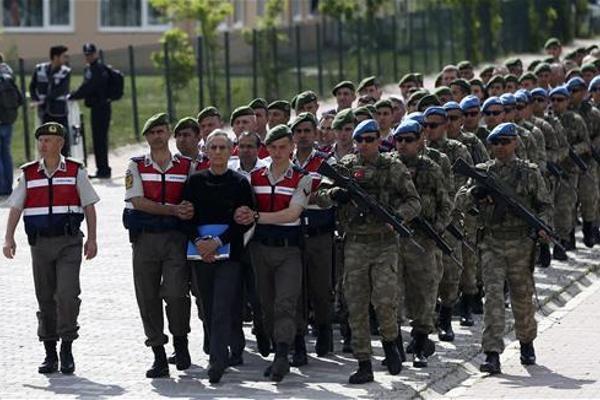Turkish intelligence agency report describes massive global Gülenist organization
Serkan Demirtaş - ANKARA


The MİT examines FETÖ’s global network and links in a report sent to the parliamentary panel tasked with probing the failed July 2016 coup attempt, staged by military personnel linked with FETÖ.
According to the report, FETÖ’s started spreading its activities in the international arena in the early 1990s, opening schools in the Turkic countries of Central Asia after the collapse of the Soviet Republic.
“FETÖ subsequently became an organization operating in 170 countries from the Balkans to the Caucasus, from Central Asia to Europe, from North America to the Far East, from the Middle East to Africa, using the foundation of religion-money-politics. FETÖ also developed links by creating communication with prominent Christian and Jewish religious figures under the title of ‘Interfaith Dialogue,’ especially after Sept. 11,” read the report.
Hundreds of companies, media outlets
The MİT report identified a total of 520 companies, 269 foundations, 147 online and offline media outlets, 58 audio-visual media outlets, 252 non-governmental organizations, 327 associations, 216 hospitals, language and culture centers linked to the group around the world. It also noted that the actual numbers were likely to be higher.
The number of schools – from pre-school to higher education institutions – that FETÖ was identified as having abroad was 767, but actual number is believed to be around 1,000, the MİT stated.
At first, the group deployed teachers and instructors from Turkey to these schools, after which it began to recruit graduates from these schools. This lowered the ratio of Turkish teachers in these institutions over the years.
The schools are not categorized under a single title but have used a number of common names like “Horizon,” “Light,” “Rainbow” and “Harmony.”
Not real teachers
The MİT report said the teachers appointed to FETÖ schools abroad have duties and responsibilities in addition to teaching, with many operating as “imams” of the country where they are sent, responsible for overseeing the group’s operations in that country. Teachers were tasked with creating good ties with the authorities, following all political, economic and social developments, and exploring new investment areas for the FETÖ businessmen in the countries where they work, it added.
Germany, Iraq come after US
The report cited 63 FETÖ-linked schools in Africa, 222 in Asia, 150 in Europe, 315 in North America, seven in South America and 10 in Oceania. In terms of countries the United States comes first with 312 FETÖ-linked schools, Germany second with 32 schools, and Iraq third with 29 schools (including those in the Iraqi Kurdistan Regional Government). Kazakhstan has 27 FETÖ schools, Kyrgyzstan has 24, Afghanistan has 23, Pakistan has 22, Nigeria has 18, Bosnia Herzegovina has 15, Albania has 14 and Kenya has 12. All other countries have less than 10 FETÖ-linked schools in their territory.
The report said these schools targets successful students from both the elite and poor segments of society, while providing scholarships to poor but talented students. Around a quarter of students fall into the latter category, the report states.
FETÖ’s strategy to expand influence
In order to avoid disclosing its real purpose and agenda, FETÖ has chosen to adopt an apolitical stance, cultivating good relationships with both local and national governments and other authorities in the countries where their schools operate while emphasizing ethics, tolerance, compromise and dialogue.
It has also been trying to increase its popularity by registering the children of respected and influential families in its schools in order to expand its political, economic and social influence.
FETÖ adopts new policy
The MİT report stated that FETÖ’s “real face has become clear” after the July 2016 coup attempt. It added that FETÖ is now “using all the networks it has cultivated over the years” to criticize the Turkish government and to push countries to take a stance against it.
“They have been sending e-mails and documents to the members of the European Parliament and U.S congressmen, holding meetings with them in a bid to accuse the current Turkish government,” it read.
FETÖ universities
The FETÖ-linked universities, departments and positions cited in the report are as follows: International Burch University in Bosnia; International Black Sea University in Georgia, Nile University in Nigeria; Epoka University in Albania, Beder University in Albania; Vistula University in Poland; Wyzsza Szkola Handlovva in Poland; Ishık University in IKRG; Süleyman Demirel University in Kazakhstan; Caucasus University in Azerbaijan (which was later transferred to the Baku High Petroleum School operated by Socar); Atatürk Ala-Too University in Kyrgyzstan; Centro de Estudios de Turquia - Universidad del Rosario in Colombia; Centro de Estudios de Turquia - Universidad Nacional de Colombia in Colombia; Üniversiteleri, Lumina South Eatern European University in Romania, Zaman University in Cambodia; Turkmen-Turk University in Turkmenistan (nationalized by the state); Fethullah Gülen Chair For Intercultural Studies at Leuvens University in Brussels; Fethullah Gülen Chair at Syarif Hidayatullah Islamic University in Indonesia; Fethullah Gülen Chair at Australia Catholic University; Intercultural Dialogue Chair at Deakin University in Australia.
